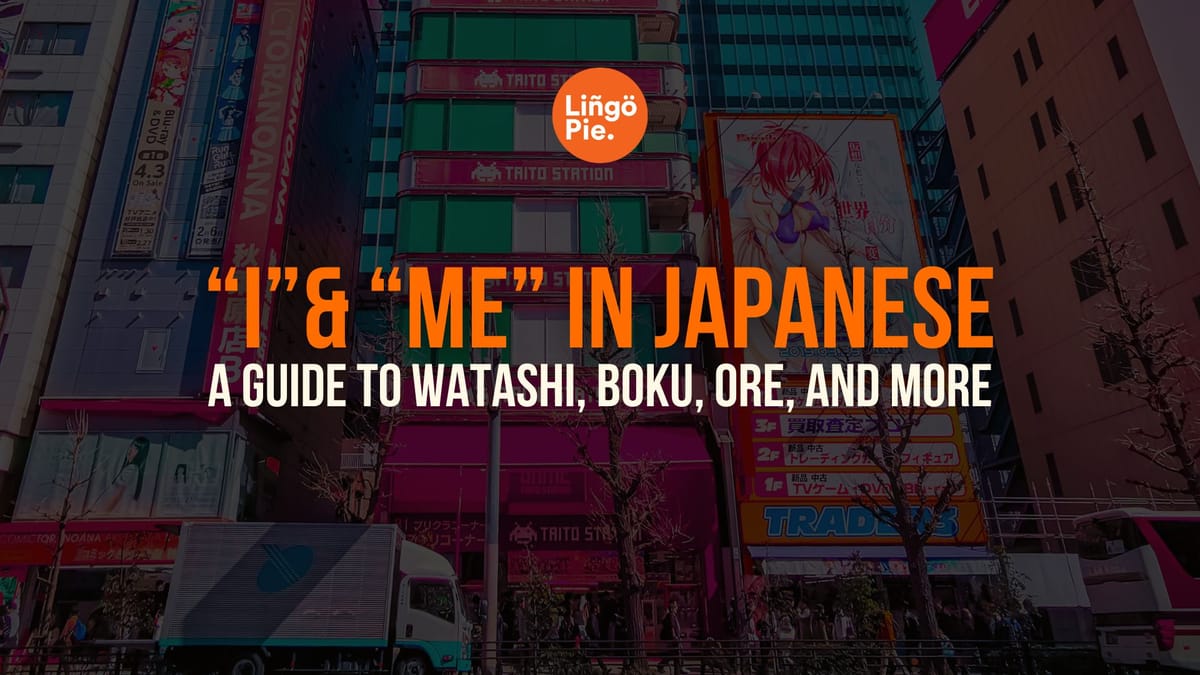If you’ve ever searched for how to say “me in Japanese” or wondered what boku, watashi, or ore actually mean—you’re in the right place.
The Japanese language doesn’t use just one word for “I” or “me.” Instead, there are multiple first-person pronouns, each with its own special usage. Some are formal, some are super casual, and some are tied to gender or personality.
This beginner-friendly guide will help you:
- Understand the meaning of watashi, boku, and ore
- Learn when to use each based on politeness, gender, and setting
- Avoid sounding awkward or too intense when speaking Japanese
Whether you’re learning Japanese for travel, anime, or conversation, knowing which pronoun fits your style will make you sound much more natural. Let’s start with the basics and work our way up.
- Japanglish: 26+ Japanese English Words You Can Easily Learn
- 70+ Japanese Anime Phrases Every Fan Heard At Least Once
- How To Say Yes In Japanese: 5+ Easy Ways For Beginners

How To Say Me In Japanese?
In Japanese, first-person pronouns reflect your relationship with the listener, the setting (formal vs. casual), and even how you see yourself. That’s why men, women, kids, coworkers, and anime characters all use different words for "I."
In casual conversation, Japanese people often don’t say "I" at all—they just drop it. In fact, constantly using first-person pronouns when they’re not necessary can make you sound unnatural or even slightly self-centered. When everyone in the conversation already knows you’re talking about yourself, just skip the pronoun!
Example:
- わたしは銀行へ行ってきます (Watashi wa ginkou e ittekimasu) — I'm going to the bank.
You could just say: 銀行へ行ってきます (Ginkou e ittekimasu) — Going to the bank. But when you do use a pronoun, the one you choose says a lot. Let’s break it down.
| Pronoun | Pronunciation | Gender Bias | Formality | Tone |
|---|---|---|---|---|
| わたし | wah-tah-shee | Neutral / Feminine casual | Polite | Safe, respectful |
| ぼく | boh-koo | Mostly male | Semi-formal | Humble, soft |
| おれ | oh-reh | Male | Casual | Confident, bold |
| あたし | ah-tah-shee | Female | Casual | Cute, informal |
| わたくし | wah-tah-koo-shee | Neutral | Very formal | Reserved, distant |
| じぶん | jee-boon | Mostly male | Neutral | Stoic, logical |
| うち | oo-chee | Female (Kansai) | Casual | Warm, local |
Watashi (わたし)
Who uses it: Men and women in formal or neutral settings
Where to use it: Business, school, meeting someone for the first time
Tone: Polite, standard
"Watashi" is a gender-neutral and polite pronoun that works almost everywhere. In daily life, you’ll mostly hear women using it casually. Men might use it in formal situations but often choose a different word with friends.
Example:
- "Watashi wa Nihon ni iku." (私は日本に行く。) "I'm going to Japan."

Ore (おれ)
Who uses it: Men in casual settings
Where to use it: With friends, family, or peers
Tone: Confident, rough (sometimes overly so)
"Ore" is bold and laid-back. It shows strength and assertiveness, often heard in male friend groups or anime protagonists. But it can feel aggressive or too direct in professional settings, so avoid it in anything remotely formal.
It’s okay to grow into using "ore" as you become more familiar with casual Japanese culture, but wait until you’re sure it fits the vibe.
Example:
- "Ore wa ashita kuru." (俺は明日来る。) "I'm coming tomorrow."
Boku (ぼく)
Who uses it: Boys and men (mostly)
Where to use it: Friendly or slightly formal situations
Tone: Gentle, humble
"Boku" is often used by young boys or adult men who want to sound modest or friendly. It’s softer than some other male pronouns and fine for workplaces where things aren’t too formal. Women typically don’t use "boku," though there are exceptions in very specific contexts (e.g., tomboyish speech in anime).
Example:
- "Boku wa sushi ga suki." (僕は寿司が好き。) "I like sushi."
Boku (僕) is often written in kanji, but you'll also see it in hiragana (ぼく) in manga and anime targeted at younger readers.

Watakushi (わたくし)
Who uses it: Men and women in business or ceremonial situations
Where to use it: Job interviews, speeches, official events
Tone: Very formal, distant
"Watakushi" is a polished version of "watashi." It shows respect but sounds stiff in everyday conversation. If you’re unsure how formal you need to be, using this in professional settings is a safe bet.
Example:
- "Watakushi ga o-denwa shimashita." (わたくしがお電話しました。) "I was the one who called."
Jibun (じぶん)
Who uses it: Mostly men, often athletes or military types
Where to use it: Sports settings, Kansai dialect, personal reflection
Tone: Reserved, sometimes assertive
"Jibun" literally means "oneself," but it can be used like "I" depending on the context. In some regions (especially Kansai), it even doubles as "you." Just note that its tone can feel blunt or emotionally detached. Often used in sports teams or group-focused settings. Best avoided in delicate or formal conversations.
Example:
- "Jibun wa kanōsei wo shinjiteiru." (自分は可能性を信じている。) "I believe in possibility."

Uchi (うち)
Who uses it: Mostly young women, especially in Kansai
Where to use it: Among friends and family
Tone: Casual, feminine, cozy
"Uchi" means "home" or "inside," but in Kansai dialect, it’s commonly used to mean "I" (especially by girls). It carries a warm, familiar tone. If you're in western Japan or want to sound kawaii and friendly, "uchi" might suit you. But outside those settings, it can feel too cute or niche.
Example:
- "Uchi, sore shiranakatta!" (うち、それ知らなかった!) "I didn't know that!"
Atashi (あたし)
Who uses it: Women
Where to use it: Casual conversations
Tone: Soft, feminine, informal
"Atashi" is an even more relaxed take on "watashi," dropping the "w" to create a smoother, girlier tone. It’s often used by women in casual settings and shows up a lot in everyday conversations, dramas, or texting. Skip this one if you’re in a formal environment or not sure how it’ll be received.
Example:
- "Atashi, choko daisuki!" (あたし、チョコ大好き!) "I love chocolate!"
Using Your Name Instead
Young children often refer to themselves by name before they master pronoun usage. Some adults (particularly women cultivating a cute persona) might also use this pattern.
For example, instead of saying "Watashi wa kōhī ga hoshii" (I want coffee), they might say "Yuki wa kōhī ga hoshii" (Yuki wants coffee).
This practice has a distinctly childlike quality to it. When adults do it, they're either being playful, trying to appear endearing, or it's simply a personal speech habit they've maintained.
So, What Should You Use?
If you're:
- A beginner → Start with Watashi (safe and polite)
- A guy looking to sound casual → Try Boku or Ore (depending on vibe)
- A woman speaking casually → Watashi, Atashi, or even Uchi if you're in Kansai
You don’t need to memorize them all now. Just pick one or two that suit your style and stick with them until you're comfortable.
How To Say “We” In Japanese?
Since you're already here, why not try to learn how to say we in Japanese as well, right? The Japanese language also has several ways to say "we," depending on tone and gender. Most are formed by adding -tachi (たち) or -ra (ら) to a singular pronoun.
| Pronoun | Meaning | Tone & Use |
|---|---|---|
| 私たち (watashitachi) | We (neutral) | Polite, safe for everyone |
| 僕たち (bokutachi) | We (male group) | Friendly, humble tone; men or boys |
| 俺たち (oretachi) | We (male group) | Very casual, rougher male tone |
| 僕ら (bokura) | We (male group) | Casual and softer than oretachi |
| 俺ら (orera) | We (male group) | Super casual, used among close friends |
| 私たち (watakushitachi) | We (very formal) | Speeches, ceremonies, business |
Examples:
- 私たちは友達です。(Watashitachi wa tomodachi desu.) — We are friends.
- 僕たちはサッカーが好きです。(Bokutachi wa sakkaa ga suki desu.) — We like soccer.
- 俺らは今日休むよ。(Orera wa kyou yasumu yo.) — We're taking the day off.
Now It's Your Turn
The variety of first-person pronouns might seem daunting at first, but it's actually one of the most fascinating aspects of Japanese. These pronouns give you tools for self-expression that simply don't exist in English.
As you continue learning Japanese, pay attention to how different people use these pronouns in various situations. Over time, you'll develop an intuitive feel for which ones fit your personality and each social context.
Which Japanese first-person pronoun feels most like "you"? Are you a polite watashi-speaker, a friendly boku-user, or a confident ore-type? Whatever you choose, make it authentically yours!
To hear these pronouns in a natural context and master them through real Japanese conversations, try Lingopie. Our streaming library of Japanese shows and movies with interactive subtitles lets you experience how native speakers actually use watashi, boku, ore and more in everyday situations.
FAQ: Common Questions About "Me" in Japanese
What does 'boku' mean in Japanese?
Boku (ぼく / 僕) is a humble, polite way for boys and men to say "I" in Japanese. It’s softer than “ore” and works in casual or semi-formal settings.
Is 'ore' rude in Japanese?
Ore (おれ / 俺) sounds bold and masculine. It's fine with close friends, but it can come off as too rough or arrogant in formal or unfamiliar situations.
What’s the difference between 'watashi', 'boku', and 'ore'?
- Watashi: Polite and gender-neutral. Safe in formal settings.
- Boku: Casual-polite, mostly used by men or boys. Softer tone.
- Ore: Casual and masculine. Stronger tone, not for formal use.
How do you say 'me too' in Japanese?
You can say わたしも (watashi mo) or ぼくも (boku mo) depending on the pronoun you use. "Mo (も)" means "too" or "also."
What does 'watashi wa' mean?
Watashi wa (私は) literally means "As for me..." It's how you'd start a sentence like "I am a student" — "Watashi wa gakusei desu."
Is 'atashi' the same as 'watashi'?
Atashi (あたし) is a casual, feminine version of watashi. You’ll hear it in relaxed conversations or from characters in anime.
What’s the kanji and hiragana for 'me’‘ in Japanese?
- Watashi: 私 (kanji), わたし (hiragana)
- Boku: 僕 (kanji), ぼく (hiragana)
- Ore: 俺 (kanji), おれ (hiragana)
Can I use 'watashi' if I'm a guy?
Yes! Especially in formal situations like work or school. In casual conversations, some men prefer "boku" or "ore."
What’s the Japanese word for 'my'?
Use the particle の (no) to show possession. Example: "my book" = watashi no hon (私の本).
How do you say 'I am' in Japanese?
Start with your pronoun (e.g., watashi, boku), then add wa and your status.
Example: Watashi wa gakusei desu = "I am a student."




![Counting In Dutch: A Beginner's Guide To Dutch Numbers [2026]](/blog/content/images/2025/04/Counting-in-dutch.jpg)

![12 Best Japanese TV Shows To Learn Japanese [2026]](/blog/content/images/size/w300/2023/09/C-pia-de-imgs-blog---Spanish-1--10-.png)
![How To Write The Japanese Kanji For Love [+ FREE Printable]](/blog/content/images/size/w300/2025/03/Japanese-Kanji-for-Love-1.jpg)

